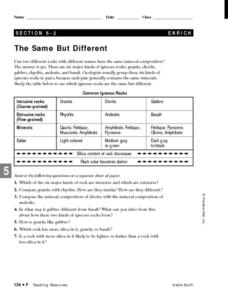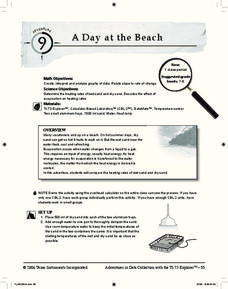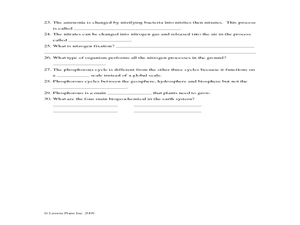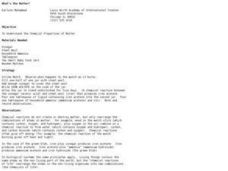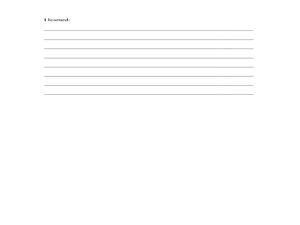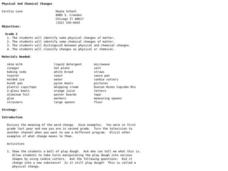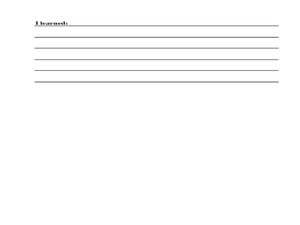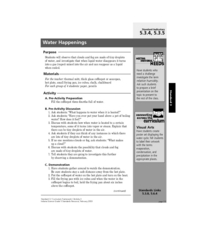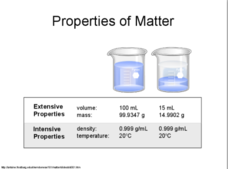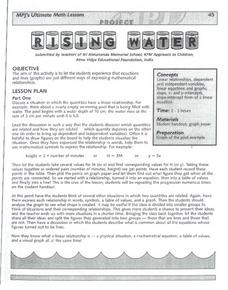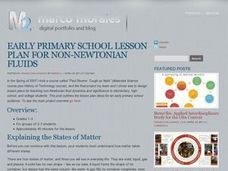Curated OER
The Same, But Different
Third graders examine the phase change between solids and liquids and determine it to be a physical change. Ice is the perfect item to use to demonstrate this phase change. Pupils experiment with measuring and weighing solid ice and the...
Curated OER
Cool Stuff
Young scientists must place a check mark next to the answer they think is correct regarding things that are warm, cool, hard, and soft. This would be a good way to begin discussing how some things actually change states of matter...
Curated OER
A Day at the Beach
Help learners determine the rate of change for the temperature of sand. They will collect data on the temperature of wet and dry sand over time with a heat lamp overhead. Then make a scatter plot of the data and find a linear model to...
Curated OER
Biogeochemical Cycles Study Guide
The four cycles in Earth's biogeochemical system are covered in this instructional activity. Science stars fill in the blanks or define vocabulary terms pertaining to the hydrologic, carbon, nitrogen, and phosphorous cycles. This...
Center for Learning in Action
Gases
Explore the properties of gases through one activity and two investigations in which super scientists observe the changes gas makes when encountering different conditions.
Curated OER
What's the Matter? (Living and Non-Living Things)
Understand how chemical reactions recombine atoms to create the "chemicals of life". An experiment, showing the basic chemical reactions of an iron nail or a match, helps young children start their understanding of permanent changes.
Curated OER
Chemistry Review
In this chemistry review worksheet, students identify chemical changes, isotopes, ions, and chemical bonds. This worksheet has 32 multiple choice questions.
Curated OER
BioFuels: The Chemistry and Economics of Alternative Fuels
Junior chemists manufacture biodiesel in the lab. In this exercise, they check the purity of the biodiesel using thin layer chromatography. They also calculate its density and heat of combustion. They are sure to rise to the challenge...
Curated OER
Heat and Matter
Students explore liquids and solids by conducting in class experiments. In this matter lesson, students define the properties of matter and how heat can change those properties. Students experiment with heating objects such as butter and...
Curated OER
THE WONDERFUL WATER CYCLE
Students are introduced to the processes of evaporation and condensation as they observe physical changes in water. They observe how matter changes from a solid to a liquid state. Students are explained that steam is water in its gaseous...
Curated OER
Physical And Chemical Changes
Second graders identify physical and chemical changes of matter. They distinguish between physical and chemical changes. They classify changes as physical or chemical.
Curated OER
Hydrologic Cycle Scavenger Hunt
Students explore the water cycle using educational resources. In this water cycle instructional activity, students use a global climate DVD to complete a scavenger hunt on the hydrologic (water) cycle.
Curated OER
Changing States of Matter - Making Ice Cream
Students make ice cream as a result of viewing changes of states of matter. In this matter lesson plan, students learn how heating and cooling can effect a state of matter to change.
Curated OER
Changing Matter
Fifth graders conduct an experiment. In this changing matter lesson plan, 5th graders receive a cup of crystals, record their observations, add water to the crystals and record new observations. Students then discuss the differences...
Curated OER
Changes of State
Students examine molecules and the changes in energy of a system. In this energy systems lesson students complete a lab activity and describe changes of state.
Curated OER
Water Happenings
Fifth graders observe how water changes phase through a teacher-led demo. In this earth science lesson, 5th graders relate the demo to the water cycle. They draw and label each stage of the cycle.
Normal Community High School
Density
Change the density of water by adding minerals. The presentation discusses density—from the definition to calculations—and applies it to the real world. It briefly mentions specific gravity, and finishes by showing Archimedes' principle.
Institute of Electrical and Electronics Engineers
Heart of the Matter
Hands-on experience with valves and water flow supports young researchers' understanding of valve operation. Attached resources for learners are text-dense; I'd break up the text into smaller pieces for groups to read and present...
NASA
Melting Ice: Designing an Experiment
Sometimes, despite the best laid plans, the unexpected will occur. Learners witness this firsthand as they carefully design an experiment to determine the time needed for ice to melt in salt water or pure water. They uncover facts not...
Polar Trec
Down to the Deep Virtual Lab
At a depth of 3,000 m in the ocean, the pressure is 300 times that at sea level! In the activity, individuals predict what will happen to Styrofoam cups submerged 3,000 meters into the ocean. They then convert these units to soccer...
Curated OER
What Changes Occur When Water Freezes?
Learners investigate the changes that occur at the molecular level when a liquid becomes a solid. They freeze water in baby jars and observe the changes that occur in the process.
Curated OER
Constancy and Change
Second graders identify three forms of matter- solids, liquids, and gases with 100% accuracy. They observe what happens when they try to put two kinds of matter into the same space and conclude that solids, liquids, and gases occupy space.
Curated OER
Rising Water!
Students observe water change from a liquid to a gas state when heated and then return to its liquid stage when cooled. They learn that gas molecules move faster than liquid molecules. They discover physical properties that describe how...
Curated OER
Non-Newtonian Fluids
Learners will use water, cornstarch, eggs, and more to explore the different states of matter. They will make observations of an unknown substance called "Oobleck" and test its liquid and solid properties. This would be a great lesson to...


